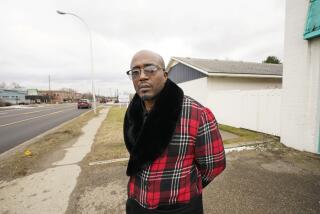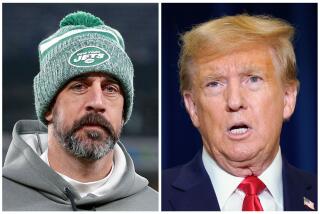The Not So Refined Art of Denial
- Share via
You’re 4 years old. You have cookie crumbs on your face and pottery shards around your feet. You hear your mother’s footfall and see her shadow loom across the door. Naturally, you say the first thing that comes to mind: “I didn’t do it!” Or, if you’re advanced, “It was my baby brother!”
Time passes. You marry. You polish your professional image. Temptation continues in all its adult forms. Now, if you get caught, the price will be your job, your family, your dignity. When accused, your most primitive instinct to bunker down may well surface; but you also now have an arsenal of fancy denials at your disposal.
For instance, Los Angeles political consultant Joseph Cerrell suggests, “Somebody left a note saying it’s OK to eat the cookie. What’s the purpose of the cookie being there if not to be eaten? How did I know someone was trying to get me into trouble? I thought dinner was at 9 instead of 6.
“There’s always some way to weasel yourself out of trouble,” he says. “It’s all part of the game.”
The most brazen still employ the “big lie technique.” When faced with, “You sideswiped my car,” they reply, “No, I didn’t,” even after you respond, “We were watching you do it.”
“If you say it over and over, louder and louder, even you believe the lie is true,” says Cerrell.
Depth of personal conviction can be effective in boosting credibility, says Lyn Nofziger, former aide to both Richard M. Nixon and Ronald Reagan.
Nofziger recalls the late Jesse Unruh, a longtime power in California politics, complaining that Reagan always believed what he said was true, even if it wasn’t.
“He said, ‘When I say something and know it’s not true, everybody knows I’m lying.’ The thing with Ronald Reagan was, Ron never thought he was saying anything that wasn’t true. He didn’t believe he was capable of telling a lie.”
On the other hand, overly forceful denials that embellish the accusation, such as “I am not a crook!” tend to be counterproductive and serve only to illustrate how denying remains more of an art than a science.
Many now favor a prompt, strong and public denial accompanied by an “I’ll get back to you tomorrow with substantive details.”
That approach, Cerrell says, was used successfully by a former client, San Francisco Mayor Joseph Alioto, when he was accused of having Mafia connections.
Alioto replied to each allegation that was made in a 1970 Look magazine article and subsequently won a libel judgment against the magazine.
Accused of having an affair with White House intern Monica S. Lewinsky, President Clinton’s initial denial was criticized as too weak, and he followed up this week with a stronger, more specific one.
First Lady Hillary Rodham Clinton also denied the allegations, artfully promised more evidence later, but then tried to redirect attention with a counter-accusation of a “vast right-wing conspiracy.” That forced special investigator Kenneth Starr to then issue his own elegant, one-word denial: “Nonsense.”
In the face of particularly tawdry or bizarre accusations, some would rather skip the denial altogether. Film director Roman Polanski, who fled to Europe after being convicted in 1978 of having sex with a 13-year-old girl, observed that if you’re forced to issue a statement denying you had sex with a zebra in Piccadilly Circus, you can be sure that’s what everyone will always remember about you.
Blanket public denials, such as, “I am 100% not guilty,” are obviously problematic if evidence arises that is hard to refute.
“We tell people not to deny. That’s the worst thing you can do,” says Donna Lucas, who was press secretary to former California Gov. George Deukmejian and ex-President George Bush, who now has her own public relations firm. Much better, she says, is to take 20 minutes, assess the facts, and come out first with your own spin.
Basically, denials thrive among adults still trying to avoid confrontation and continue doing what they want to do, says Los Angeles psychiatrist Mark Goulston. In an ideal world, friends and family and the voting public would be so forgiving that elaborate denials would be unnecessary, he says. Most people will forgive an honest mistake, even when the truth is unpleasant, but what they find harder to forgive is a denial that seems like a lie.
“One of the basic foundations for any kind of relationship is trust,” he says. “What bothers you is all the other things you don’t know about.”
In the spirit of honesty, some celebrities and corporations have tried partial confessions (“mistakes were made”) or complete public confessions accompanied by regret or entrance into a substance abuse clinic.
Some attempt preemptive denials, also known as “getting it out of the way” before the indiscretion is discovered. But that can be risky, depending on the sin, Nofziger says. Marijuana smoking or drunk-driving confessions seem to wash better than infidelity.
Nofziger recalls, “There was a guy running for governor of Colorado who had some serious divorce problems. He and his new wife, who had been his mistress, thought the best thing to do was get this out. They got it out and it killed him.”
More to Read
Sign up for Essential California
The most important California stories and recommendations in your inbox every morning.
You may occasionally receive promotional content from the Los Angeles Times.













